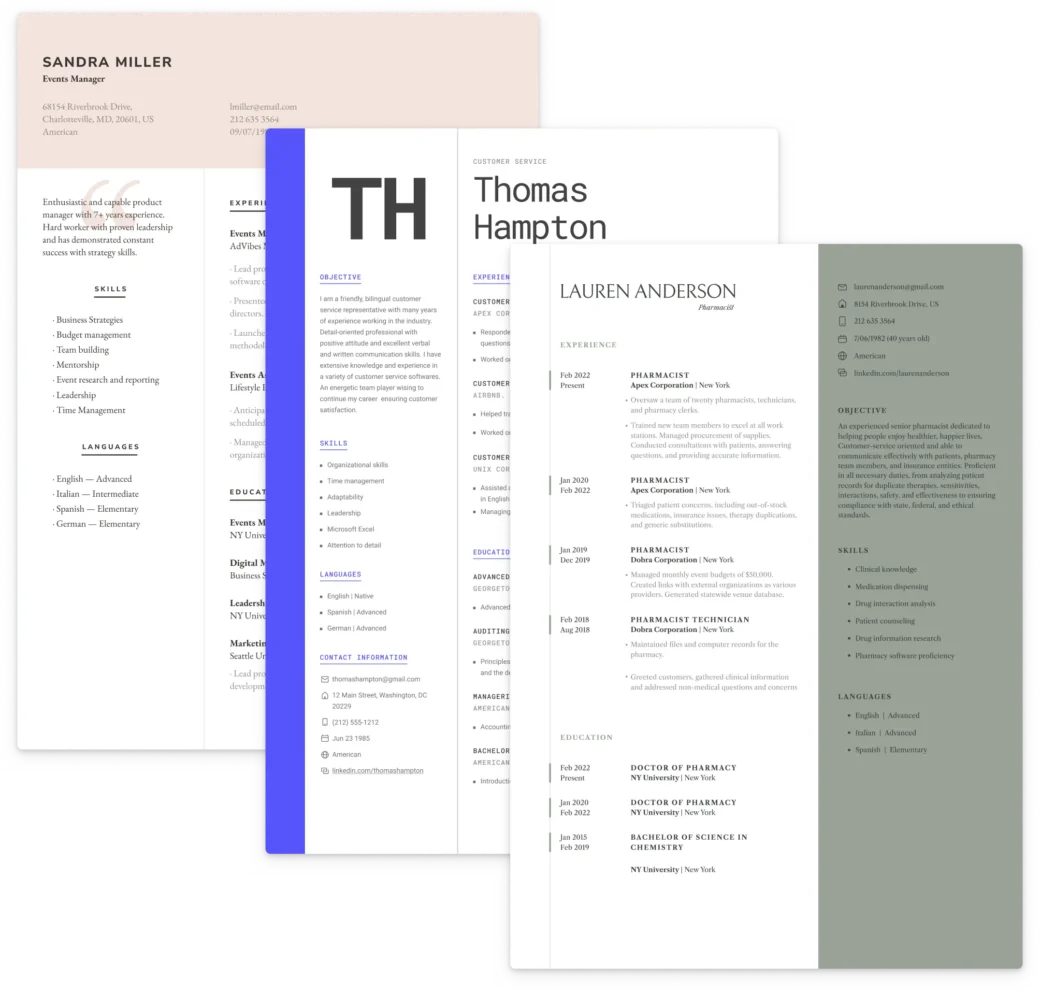Adding language skills to your resume are often taken for granted. After all, how hard could it be to write, “Can speak, read, and write in Spanish” somewhere on your resume?
While that might seem like enough for most employers, there are better ways to include language skills on your resume besides a simple sentence.
In this ResumeGiants article, you will learn how to list effectively include language skills on your resume, so they make the most impact with employers. Let’s begin!
What Are Language Skills?
Before we jump into adding sections to your resume, it’s important to understand what we mean by “language skills.” No, it’s not your ability to sweet talk your way out of any situation!
Language skills refer to your understanding of additional languages besides just the one in which your resume is written.
For example, if you’re reading this blog, chances are your resume is in English. Because your resume is in English, employers know you understand that language.
But, depending on the job you’re applying to, you might want to tell employers that you can comprehend Spanish and French, too. For example, if you are looking for a job in Europe.
These are the language skills you want to put on your resume.
Must know
Language skills refer to spoken languages. This isn’t where you include your proficiency in programming languages like Python or JavaScript.
Do Employers Really Care?
In short, yes! However, they might not take it as seriously as you think.
When an employer sees language skills on a resume, they don’t expect you to write a novel in that language. They only want to know that you can communicate with coworkers and customers in that language if the need arises.
In many cases, especially with international companies, employers also like to see language skills because it shows that you have culture-specific knowledge.
If you say you speak Spanish, there’s a good chance you understand at least some Hispanic or Spanish culture (depending on location). This is a huge benefit if the company works with customers from a different country or background.
When To Include Language Skills on Your Resume
When it comes to resumes, the shorter and more concise, the better! That means space is very valuable, and you don’t want to waste any on unnecessary information or details.
Language skills aren’t always important to put on your resume, so you should only include them if:
- It’s required in the job description – Obviously, if the job description specifically mentions that you need language skills, by all means, add them to your resume!
- You’re going to work with the public – Businesses never know who’s going to wander through the door. If the job you’re applying to require you to work with the public, language skills on your resume let employers know you can communicate with more customers.
- The position is competitive – Not everyone has your language skills. If you’re applying to a job that’s super competitive, your language skills might be just enough to put you above some other applicants.
- You don’t have much experience – Language skills show off more than just your ability to speak a different language. They show you’re a quick learner and can apply knowledge to real-world situations. Include language skills to your resume if you’re struggling to come up with enough relevant professional experience.
- The job is in a different country – Applying for a job in a different country? The employer will want to know you can speak the language. Make sure you include those language skills on your resume to make it clear.
If none of these situations apply to you, then you should save the space on your resume and omit any language skills. For some jobs, it’s just not necessary!
Use the extra space to include information that’s more relevant to the position you’re applying to.
How To Describe Language Proficiency
Not only do employers want to know if you can understand other languages, they want to know how your level of understanding.
After all, there’s a big difference between being fluent and being able to only pick out a few words here and there.
Here are a few ways to describe your language proficiency on your resume.
Language comprehension levels
The most common way to include language proficiency on your resume is with comprehension levels. Basically, it’s your own description of how well you comprehend a language.
There are 5 standard levels of language proficiency people use to describe their language comprehension:
- Beginner – You’re just starting to learn a language. You can understand a few basic words and phrases, but you can’t entirely hold a conversation or have a firm understanding of grammar rules.
- Intermediate – You can speak a language but with some difficulty. You can probably hold a conversation and can read somewhat proficiently, but your vocabulary is limited and you can’t speak as fast as a native speaker.
- Proficient – You can read, write, and speak a language without much difficulty. You can easily work your way through conversations, though you might struggle occasionally with colloquialisms when talking to a native speaker.
- Fluent – You can read, write, and speak a language without any hesitation or difficulty with understanding.
- Native – You grew up speaking this language and is your preferred language. You have honed your ability to speak this language with years of formal education.
The more proficient you are with a language, the better it looks on your resume. Keep that in mind when listing language skills on your resume.
For example, if a job description mentions you’ll absolutely need to use a certain language to perform the duties, don’t list your beginner comprehension of the language. You’re not qualified.
On the other hand, if you’re using your language skills to stand out among the competition, listing beginner skills is perfectly acceptable.
Language proficiency and official language certificates
For a little extra oomph behind your language skills, there are tests you can take to receive a language proficiency certificate. That way, employers don’t have to take your word for it; you have proof!
The most widely accepted language skill frameworks include the US Department of State, the American Council for the Teaching of Foreign Languages (ACTFL), and the EFSET. Just choose your framework of choice, take the test, and use the results on your resume.
LinkedIn has also created its own scale that’s quickly becoming more widely accepted by employers and recruiters. It breaks down language proficiency into 5 levels:
- Elementary
- Limited Working
- Professional Working
- Full Professional
- Native/Bilingual
Using LinkedIn’s scale makes it easy to match your physical resume to your LinkedIn resume. That way, no matter where employers look you up, they’re going to see the same information without any discrepancies.
Where To Put Language Skills on Your Resume
Where you should put language skills on your resume varies depending on 2 factors:
- Your level of proficiency
- Relevance to the position you’re applying to
If you have a high level of proficiency, like fluent or native, or if language skills are essential to the position to which you’re applying, it’s best to include them in a dedicated section of your resume.
However, if you have a lower level of proficiency and/or language skills aren’t essential for the position, you can still include them on your resume.
For that, just list them in another part of your resume, like skills, previous experience, or education sections. When it comes to actually listing your language skills, it’s best to keep it simple and concise.
It’s essential to describe your language skills in official terms. For instance, it’s critical to know how to say fluent in another expression, such as “native”. Certifications such as CEFR (Common European Framework of Reference for Languages) and ILR levels (Interagency Language Roundtable) can be used to accurately demonstrate proficiency.
For instance, for candidates who have a native level in two languages and have an intermediate level in a third language, it’s recommended to clearly state which languages you speak fluently. Then, state your proficiency in the third language.
Here is an example of how lo list languages when you have official certificates:
English
- Native
Spanish
- Native (ILR Level 5)
French
- Intermediate (CEFR B1 Certification)
Let’s take another example into account. Candidates who are native in one language with an intermediate level in one or two other languages have more pressure to prove their expertise as terms aren’t as specific as “native”. That means describing language skills correctly is even more important.
Using keywords such as “full professional proficiency” can summarize your language level quickly and show that you can work in that language. If you speak multiple languages at a non-native level, you should specify your ILR levels or include any certificate that you have.
English
- Native
Spanish
- Full Professional Proficiency (ILR Level 4 )
Chinese
- Professional Working Proficiency. Plus (ILR Level 3+)
On the other hand, you may never have gotten the chance to make your proficiency official. That means, your level isn’t certified.
Don’t worry though, there’s a solution!
If you have no written proof of how well you can speak, taking an exam in Spanish or other languages is possible in various areas of the country. However, if you don’t have the time and need to apply right away you can still impress a hiring manager.
It’s recommended to describe your language aptitude with specific examples of how you know the language. For example, you may have taken French every semester of college or lived abroad for long period.
English
- Native
French
- Full Professional Proficiency (Lived in France from 2017-2022)
Italian
- Professional Working Proficiency (Studied 4 years of Italian in college)
If you have a high level of linguist skills in any language other than your native tongue, it’s a great idea to have an official rating or certificate to show off on your resume.
Final Thoughts: Putting Language Skills on Your Resume
Language skills aren’t essential for every resume. In the end, it all depends on what position you’re applying for.
For jobs that requires language skills or interaction with the public, absolutely include a language skills section somewhere on your resume.
You can also throw in some language skills if you want to stand out in a highly competitive position or if you don’t have much professional experience, though it doesn’t necessarily need a dedicated section.
If you’re not sure how to include language skills on your resume, we have dozens of resume templates that include language skills.
All you have to do is use the ResumeGiants free online resume builder, download the template of your choice, and fill in your information. You’ll be ready to show off your language skills to potential employers in no time!

Build your perfect resume with ease
Craft the perfect resume effortlessly with our builder. Get started today!
Related Posts
